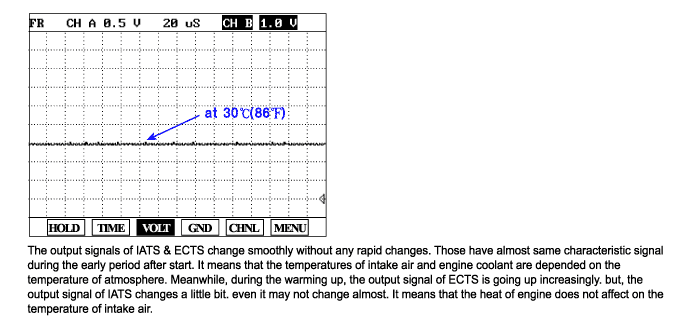

The Engine Coolant Temperature Sensor (ECTS) is located in the engine coolant passage of the cylinder head for detecting the engine coolant temperature. The ECTS uses a thermistor whose resistance changes with the temperature. The electrical resistance of the ECTS decreases as the temperature increases, and increases as the temperature decreases. The reference 5 V in the PCM is supplied to the ECTS via a resistor in the PCM. That is, the resistor in the PCM and the thermistor in the ECTS are connected in series. When the resistance value of the thermistor in the ECTS changes according to the engine coolant temperature, the output voltage also changes. During cold engine operation the PCM increases the fuel injection duration and controls the ignition timing using the information of engine coolant temperature to avoid engine stalling and improve drivability.
The Engine Coolant Temperature High Rationality Diagnostic checks for unusually high engine coolant temperatures under normal operating loads.
PCM monitors difference between the startup and current coolant temperature and compares agaist the threshold while enable condition is met. If the PCM detects that the coolant temperature exceeds the limit under normal operating condition, PCM determines that a fault exists and a DTC is stored.
Item | Detecting Condition | Possible cause |
DTC Strategy | ● This diagnostic introduces a calibratable delay and simultaneously looks out for excessive engine loads. Once the delay period passes and excessive loads have not been experienced, the diagnostic checks whether the undefaulted coolant temperature has exceeded a maximum threshold in order to make a PASS/FAIL determination. | ● Poor connection ● Lack of engine coolant ● Water pump ● ECTS ● PCM |
Enable Conditions | ● Engine Running status ● No disabling faults present ● Coolant Sensor within range ● Undefaulted Coolant Temp ≥ 50°C( 122 °F) ● Undefaulted IAT ≤ 35°C( 95 °F) ● Soak time ≥ 360min or Undefaulted Coolant temp ≤ 45°C( 113 °F) | |
Thresh old value | ● Coolant temperature ≥ 110°C (230 °F) ● Average airflow < 30g/s and filtered airflow < 50g/s | |
Diagnosis Time | ● Continuous More than 12.5 sec.failure for every 15 sec.test) | |
MIL On Condition | ● 2 Driving Cycles |
Temp. (°C/°F) | Resistance (kΩ) | Temp. (°C/°F) | Resistance (kΩ) |
-40(-40) | 48.14 | 40(104) | 1.15 |
-20(-4) | 14.13 ~ 16.83 | 60(140) | 0.59 |
0(32) | 5.79 | 80(176) | 0.32 |
20(68) | 2.31 ~ 2.59 |
|
|
